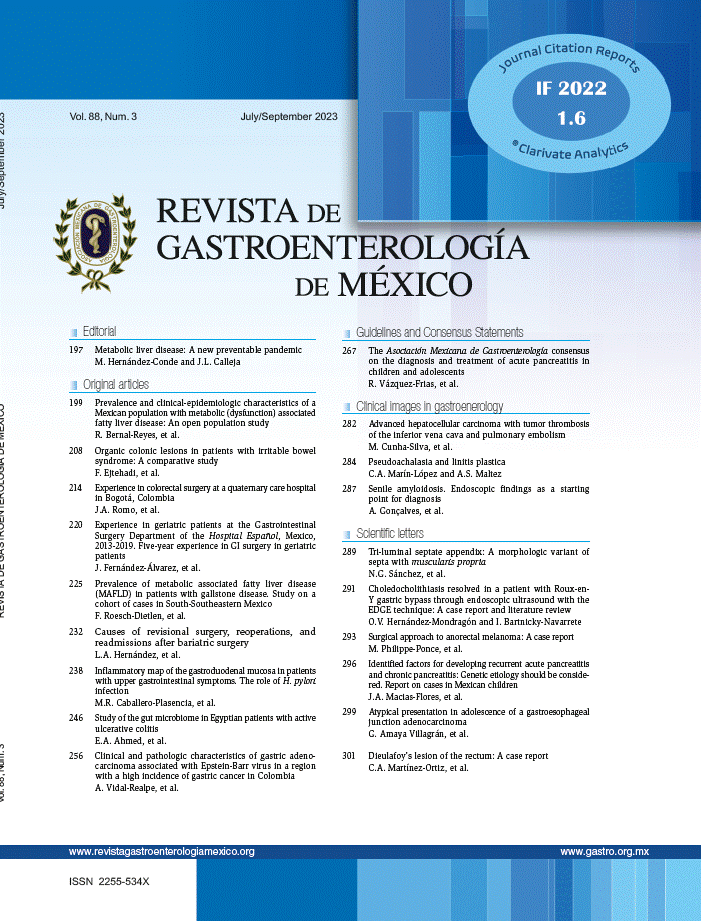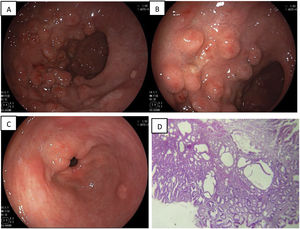Ménétrier disease (MD) is an enteropathy characterized by gastric fold hyperplasia and a state of protein loss. Pharmacologic treatment has shown varying results, and in cases of refractoriness, gastrectomy is a therapeutic option.1,2
A 58-year-old woman with 4-month progression of the disease presented with mild epigastralgia, nausea, and lower limb edema. Laboratory work-up reported Hb 10g/dl, total protein 4.8g/dl, and albumin 2.9g/dl. Endoscopy revealed multiple hypertrophic folds in the gastric body, resembling “circumvolutions” with mucus (Fig. 1A and B), and erosions at the level of the antrum (Fig. 1C). The anatomopathologic study reported marked foveolar hyperplasia, tortuous foveolar glands, and multiple cystic dilations (Fig. 1D), as well as the presence of Helicobacter pylori. Extended-release octreotide was administered at a dose of 20mg IM monthly, for 4 months, along with 1g of amoxicillin every 12h and 500mg of levofloxacin every 24h for 14 days, for Helicobacter pylori eradication, and 40mg of esomeprazole every 12h for 4 months. The eradication of the bacterium was verified. Given the lack of clinical and endoscopic improvement, monoclonal antibodies were considered the best option. However, those medications are not available at our hospital, and so total gastrectomy was performed. The patient’s progression was favorable at the follow-up at one year.
MD is a gastropathy characterized by gastric fold hypertrophy, with protein loss. It affects middle-aged men3 and is associated with gastric adenocarcinoma in 6–10% of cases.4
The disease is related to higher alpha-TGF production and epithelial cell proliferation that produce abundant mucus. The hypersecretion of mucus causes malabsorption of nutrients, electrolytes, and vitamins. Ninety percent of cases are associated with Helicobacter pylori.3,4
The clinical manifestations are epigastralgia (65%), anorexia (45%), weight loss (45%), edema (38%), and vomiting (38%); diarrhea and gastrointestinal bleeding are less frequent.3,5
Laboratory findings include hypoalbuminemia, elevated serum gastrin levels, and iron-deficiency anemia.5 Endoscopy identifies hypertrophic gastric folds that do not affect the antrum. Histologic study describes foveolar hyperplasia, oxyntic gland atrophy, and a decrease in parietal cells, as well as edema and smooth muscle hyperplasia in the lamina propria.6,7 The differential diagnosis in hypertrophic gastropathy should include infections due to cytomegalovirus and syphilis; tumors, such as adenocarcinoma, lymphoma, and Zollinger-Ellison syndrome; infiltrative diseases, such as sarcoidosis and amyloidosis; and other causes, such as eosinophilic gastroenteritis.6 Treatment includes a protein-rich diet, proton pump inhibitors, and macronutrient replacement. Octreotide has been shown to be beneficial in some patients, but in refractory cases, total gastrectomy is recommended, as in the case of our patient.8,9
In conclusion, MD is a form of hypertrophic gastropathy that presents with digestive symptoms and protein loss. In medical treatment-refractory cases, total gastrectomy should be considered an option.
Ethical considerationsThe authors declare that no experiments were conducted on humans for this research. We utilized the protocols for obtaining patient information from our work center’s database, preserving patient anonymity, so informed consent was not requested. This study meets the current bioethical research regulations.
Financial supportNo financial support was received in relation to this article.
Conflict of interestThe authors declare that there is no conflict of interest.
Please cite this article as: Alcántara-Figueroa CE, Calderón-Cabrera DC, Pariona-Martínez YK, de la Cruz-Rojas R, Alcántara-Ascón RA. Enfermedad de Ménétrier: una causa rara de gastropatía hipertrófica. Rev Gastroenterol Mex. 2023;88:435–436.





